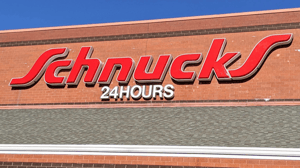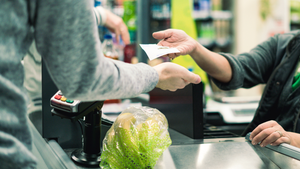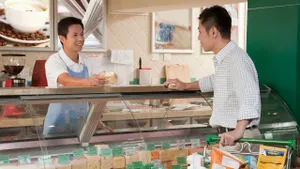Independent retailers step up during challenging times
The FMI Midwinter Executive Conference featured a panel of independent operators sharing their experiences of a turbulent year

Independent grocery operators have a unique pulse in their communities and never has that been illustrated as strongly as it was in 2020 given the stress and strain of everything that occurred — from the pandemic to racial unrest and protests.
During a candid and sometimes emotional panel discussion on the impact of these events on their businesses, five leaders of independent grocery chains shared their thoughts during the FMI Midwinter Executive Conference. Here are excerpts from that conversation.

“Keeping associates safe was No. 1”
Oscar Gonzalez, co-president and COO, Northgate Gonzalez Markets, Anaheim, Calif.
40 locations
We've been through a lot this last year and it almost feels like there was no end of year and no beginning of year, just the continuity. Just at a personal level and a team level, the impact has been transformative on all levels. When I look at the way that I have led and the way our team has led, we've led with our heart first and there's been a lot of tough decisions. There's been obviously a lot of change and ambiguity in our environments, but certainly our heart has always been there. I think one of the main things that has been very helpful for me and our team has really been to remind ourselves that our No. 1 focus from the very beginning was to keep our associates safe.
I think the second thing was really about creating a safe shopping environment, really protecting our customers. And then third was our community outreach and really going out into our communities and understanding how we as the local grocery could, could help. Those were our guiding principles.
I think one of the beautiful things, just for our team and for myself was the level of resilience that I think we all developed in this really difficult time. It was unbelievable to see, it seemed like we were running out of energy and all of a sudden there was a new reservoir of, of energy out there.

Self-service food bars remain closed at Roche Bros. stores, with no plans to open them up anytime soon.
Facing foodservice challenges
Kevin Barner, CFO, Roche Bros., Wellesley, Mass.
20 locations
In mid-March 2020, we were forced to shut down all our service departments and these included the self-serve salad bars, our hot food bars, as well as the full-service kitchens, cafes, bakeries, deli and seafood. We decided to shift to a self-serve, grab and go model. The idea was to get the customers in and out as quickly as possible. We converted to grab-and-go with the top 12 hot kitchen items. The kitchen recipes were tweaked so the meals would still taste good in a grab-and-go environment. We expanded our selection of side dishes, individual dinners, and family meals.
Olive and fruit bars were turned into prepackaged olives and grab-and-go bag fruit. And the deli departments introduced prepackaged deli meats and deli salads along with other grab-and-go deli items. And seafood began offering prepackaged fresh fish, fillets and steaks, and even some new items like Wellesley chowder fries and some seafood stuffed peppers. And we rolled out a new catering menu with all items individually packaged in the cafés. Some of them were repurposed to e-commerce staging areas to accommodate the surge in online shopping. In some cases we'll permanently eliminate the cafés and these areas will serve as e-commerce staging areas. We also retrained labor that was previously working in the service cases to help fulfill and deliver e-commerce orders.
The customers that typically would have frequented the hot bars were probably working from home. So to this day, the self-service bars remain closed. We have no plans to open them up anytime soon. As we approached the holidays, catering looked a little different and party platters were virtually non-existent even though we offered an individually packaged catering menu. We saw our spike in catering in dinner kit orders, which we expected with the restaurant restrictions in place. And we did something different. We required all catering orders to be prepaid and created separate curbside pickup locations outside the stores, inside the stores and on the front ends. We also saw a large increase in individual dinners, including Thanksgiving. Turkey dinner volumes were up four times over the last year because of this. We created new individual prime rib and ham dinners before the Christmas holiday and sold hundreds of them the week of Christmas alone. So we'll continue to offer those in the future as well.

“Fast and nimble”
Suzy Monford, CEO, PCC Community Markets, Seattle
15 locations
I spent most of the year working with Kroger, being based right there in Cincinnati, and joined the PCC team recently. I love independent operators and the fact that we can act as if we are a startup if we need to, and we can be fast and we can be nimble.
After COVID hit, those traditional customers for whom the culinary shop and experiential shop were part of their week no longer came to shop the store. And they looked to us online. So we really worked to meet them there. There's a lot that we're doing at PCC as a co-op to go, right? The delivery is terrific. How do we expand into curbside? We're going to take a multichannel view toward that upcoming day.
We make everything from scratch. We have the largest, most robust soup program, for instance, and we make all the stocks from scratch to make the soups and we buy the organic chicken to bake. So we are a full ecosystem in every single store and we're going to continue to do that. We're going to continue to focus on being great merchants every day, but look to the best-of-class third-party e-commerce providers to help us create what I consider to be a hybrid store model, the store where customers feel safe and welcome to come shop and still have that culinary experience, and a store that can speak to their delivery needs and their curbside needs. And then equally adding another element to that, which is think about dark stores and dark kitchens.

Canadian retailer Longo Bros. experienced many of the same challenges as their U.S. counterparts, with added concerns about the supply chain crossing the border.
Canadian perspective
Anthony Longo, CEO, Longo Bros., Vaughan, Ontario
35 locations
We went through many of the same issues as our U.S. counterparts did. There were definitely some differences, but overall it was very like that. We really adhered to our guiding principles. The first one was safety at all costs for our team members, for our guests in our communities, because we're all part of a bigger ecosystem within the community. The second principle was we wanted to be transparent, with the team members and with our guests.
And then lastly, which I think is an important one, is we said, let's use science wherever possible. it's not always possible because there are things we didn't know. We didn't have any data to support putting plexiglass up, but we knew it was the right thing to do. When it came to having masks for all of our team members and our guests, that came from the CDC and it came from Canada's a health minister as well.
I think the biggest difference early on was concern about the supply chain and the reason it was more of a concern for us is that a vast amount of our products come from the U S and when the borders got closed, there was a lot of confusion as to what was going to be allowed in and not allowed in. We finally figured it out, but it did take a few days and there were some concerns that we'd have shortages for some time. And even today I'd say, we're really not back to pre-pandemic in stock positions yet in some categories.
Those first couple of weeks where business doubled, it did overwhelm our team and it overwhelmed our service. In e-commerce we had some crashes early on until we ended up putting in more servers very, very quickly and the teams worked 24/7 to make all that happen. And our downtown stores have gotten pummeled. We have two of them underground office towers that are down about 75%, 80% in that marketplace. It's going to take some time for them to come back to back to their old sales. But we're committed to serving that community in terms of the consumer.

Despite COVID and damage from riots and looting last summer, Art Potash said,
A summer of riots and unrest
Art Potash, CEO, Potash Markets, Chicago
3 locations
On top of everything with COVID, we had the added burden of civil unrest in Chicago leading up to a Memorial Day and summer last year that would start out as peaceful protests during the day, then morphed into riots and looting at night.
We were looted twice at the same store, once in May and once in August, and were able to observe a looting with our in-store cameras. At least my management was, and it was very unsettling because really things were out of control. The police were overwhelmed and all we could do is watch. So the break-ins took place in the middle of the night and once they occurred, there was no police, there was no protective action. We were basically open, exposed for the entire night until daybreak when the looting stopped.
We reopened with limited hours because there was still rioting at night and then a week later reopened back up to regular hours. We took measures immediately so that our staff could be our managers. The manager in charge could be more responsive because there were still threats out there. So we immediately reminded them that at any time that they needed to they could just lock the doors and close the store, didn't matter what time of day it was. It didn't matter what the other circumstances were. We even figured out other methods for people to leave the store so they didn't have to leave through the front. So we worked out all kinds of things so that we could respond in case there was more violence.
We were able to rebound quickly as if it never happened. And then we've learned from the experience. The challenge turned into opportunities. It was really an opportunity for us to reinforce our culture, the culture of teamwork amongst our staff, especially under difficult times. That's really when your values and your culture are tested. And our culture carried us through, the spirit of teamwork, the idea that our employees were not going to take the hit financially. The experience galvanized our bond with our staff and if we stick together, the burden is much more manageable. We learned that we can take a hit and bounce back.
About the Author
You May Also Like






